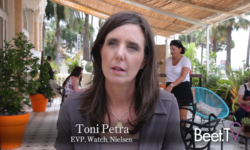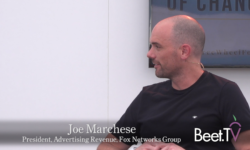CANNES—Television ratings have been a consistent metric for several decades, despite their limitations. Now that new TV ad formats are emerging, “There’s just no consistency,” according to Joe Marchese.
That doesn’t seem about to change anytime soon judging from a one-on-one interview with Marchese, who is President of Advertising Revenue at Fox Networks Group, and Dave Clark, GM of Comcast’s FreeWheel, at the 2018 Cannes Lions International Festival of Creativity. Part of the FreeWheel Forum on the Future of Television, the discussion did point to some amount of certainty.
For example, the futures market for national TV inventory known as the annual Upfronts isn’t going away anytime soon, for the simple reason that it protects buyers from price increases the way airlines hedge their bets with oil futures. The process is also something of a comfort to sellers, particularly those with the most coveted (and limited) ad avails.
The search for unification among TV sellers came about because of the digital age, according to Marchese.
“What we’ve never had to compete on before was what the currency metric was because we had Nielsen. People could complain all day about Nielsen, but at least it was consistent for everyone who was trading on it,” Marchese said.
Digital media introduced cost-per-view pricing, but when TV tries to create a new product, “everyone’s like, ‘cool, how does that fit in with what I paid you last year?’ There’s just no consistency.”
Fox has been pushing hard to establish new ad formats while reducing overall commercial load, “But if we do it alone, it won’t matter. You can’t create a market and you can’t understand what the market price of anything is if there’s only one person doing it,” said Marchese.
Given the difficulty in pricing new ad formats in something approaching a consistent manner, the lack of a common market will sow pricing disagreement. “Until then, opinions will differ. And then depending on the creative, one of us is right and one of us is wrong.”
Clark noted that the industry is will run by people who have been at it for two or three decades and asked Marchese what leadership traits and characteristics are most important.
“We need to understand that we’re just used to fighting over things because that’s just the way it was done. We’re used to negotiating with agencies over every penny because that’s just the way it was done.”
Now, in some ways, everyone’s on the same side of the table. “We have the same goal, that we would like to not kill long-form storytelling as an advertising vehicle,” Marchese said.
Responding to a question from the audience about the long-term viability of the TV Upfront, Marchese said he doesn’t think it will die. “I actually think we just get better at predicting where the inventory is going to be.”
Between now and then, he believes the “dumb definition” of a CPM—an impression is an impression—will yield to something akin to the real estate market.
“We analyze real estate not just for the square footage but for where it’s located, what are the amenities, who are the neighbors. There’s a bunch of things we do.”
This video is from a series of videos and sessions produced in partnership with FreeWheel at Cannes 2018 as part of the FreeWheel Forum on the Future of Television. You can find more videos from this series here.














































